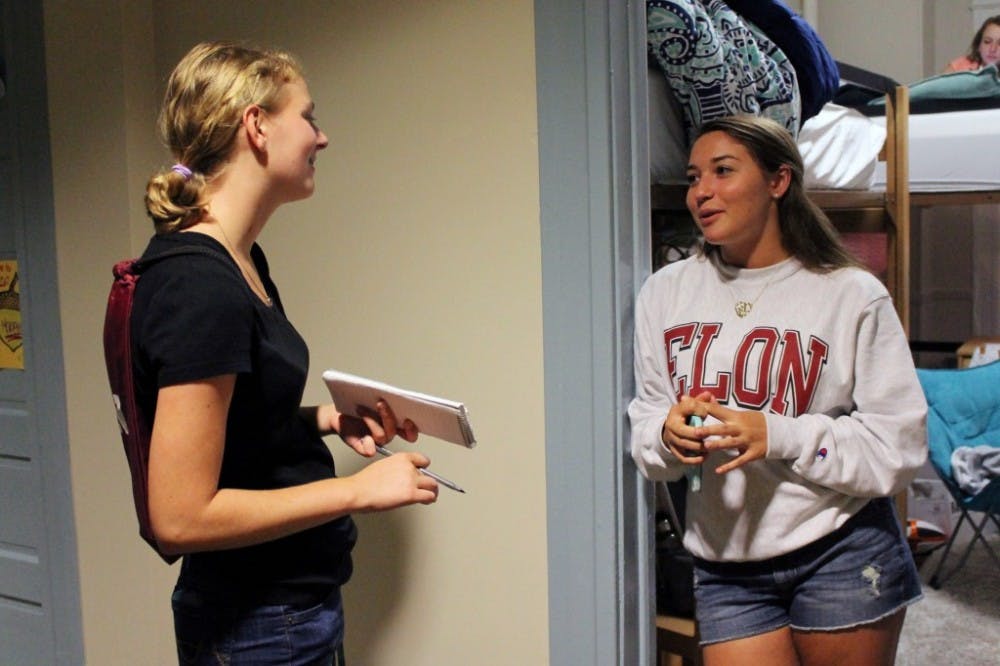The 2014-2015 school year brought changes to more than just construction areas on Elon University’s campus. With the completion of the Global Neighborhood, Residence Life has implemented its Residential Campus Initiative to change the way RAs are perceived and how students distinguish their residential neighborhoods.
“Residential assistants serve as mentors, leaders, community builders, resource providers and advocates for and with their students,” said Laura Arroyo, associate director of Residence Life for residential education.
Elon aims for a ratio of 40 to 1 between RAs and students in residence halls. To foster a closer relationship between RAs and students, Residence Life has instituted policy changes that will affect the RA job as it is currently performed.
“I think the most important thing has to do with how we work on campus,” said senior Brianna Duff, resident area coordinator in the Oaks. “The idea is that we are community builders, and our focus is not as policy enforcers.”
Residence life staff supports the idea of redefining the RAs’ position from “enforcers.”
“We need to redefine our role as not being the police,” said sophomore Lauren Brown, an RA in the Danieley Neighborhood.
These changes have included alterations to the rounds process and residential neighborhoods. Previously known as rounds, RAs now go on “community walks.”
“On the community walks, RAs emphasize one-on-one interactions,” said Brown. “Our role is to document when rules are being broken, but it’s not our primary job.”
The Residential Campus Initiative is focused on changing the perception of the RA in residential halls.
“It has to do with thinking about the RAs’ role on campus,” Duff said. “It started out as a job you did as a policy enforcer but has moved into a leadership position on campus focused on building community.”
Rather than look to the RA to document bad behavior or fix a problem, the new initiative seeks to hold all students accountable for their neighborhood community standards.
“Before, when I worked in Danieley, it was your duty to go out and make sure nothing is happening,” Duff said. “Now, you’re expecting your neighborhood and community to hold themselves accountable.”
Residence Life has also shifted to an on-call system where students can call an RA with concerns.
“This on-call system mimics the Administrator On Call that the university employs [who] is available 24/7 to all Elon students,” said Arroyo.
This change was made to ensure consistency between departments on campus.
Residence Life is also changing the way students look at their residence halls.
“We want people to bond to get the neighborhood experience,” said junior Megan Oliver, an orientation leader. “We want to foster pride in one’s neighborhood, which Elon has really stressed this year.”
Each neighborhood — Danieley, the Oaks, Colonnades, Historic, Global and Station at Mill Point — has a specific theme that it will explore. These themes range from understanding historic roots to exploring what it means to be a global citizen.
“Most of a student’s learning occurs outside of the classroom, and it is therefore important that we work to support students to deepen their intellectual knowledge and foster communities of learning in and outside of residence halls,” Arroyo said.
These changes have been met with a lot of positivity, Duff said.
“A lot of upperclassmen wish they had these opportunities as freshmen,” she continued.
Freshmen and upperclassmen are reacting similarly to the adjustments.
“I just told my residents, ‘Whatever you have in your head about RAs, throw it out the window. Everything has changed,’” said Brown. “The majority of residents really like the changes going on.”
Though students are just now beginning to see the changes, residence life has been working on them for years.
“We’ve been working towards this for more than one year,” said Arroyo. “It’s the first year they have really talked about it, but it’s about the third year we have been working on it.”
Those in Residence life are already noticing the differences.
“It’s a slow process, but there have been really positive responses, which we are all really excited about,” Duff said.


